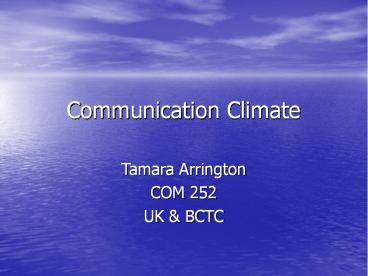Communication Climate - PowerPoint PPT Presentation
Title:
Communication Climate
Description:
Communication Climate Tamara Arrington COM 252 UK & BCTC Today we ll talk about What is a communication climate? Disconfirming & confirming messages ... – PowerPoint PPT presentation
Number of Views:715
Avg rating:3.0/5.0
Title: Communication Climate
1
Communication Climate
- Tamara Arrington
- COM 252
- UK BCTC
2
Today well talk about
- What is a communication climate?
- Disconfirming confirming messages
- Defensiveness
- Supporting behaviors
- Your response to criticism
3
Is this what the communication in your
relationships is like?
Or, is this more like it?
4
What is a communication climate?
- The term communication climate refers to the
emotional or social tone of a relationship. - It involves the way people feel about each other.
- It is a relational climate.
- Communication climates affects/reflects
relationships. - Every context has a climate this class, your
workplace, and your home.
5
Communication Climates and Conflict
- Communication climate is an extremely significant
factor when people have conflicts.
6
Factors That Affect The Communication Climate
- Disconfirming and confirming messages
- Defensiveness
- Your response to criticism
7
Confirming and Disconfirming Communication
- Developing positive and negative communication
climates
8
Confirming Communication
- Messages that convey valuing other people
- Recognition (making contact)
- Acknowledgment (listening)
- Endorsement (agreement)
9
Disconfirming Communication
- Messages show lack of regard for other
- Verbal aggression verbal abuse
- Complaining
- Interrupting
- Impervious responses (ignoring other persons
attempt to communicate)
10
What is Defensiveness?
- Protecting oneself from attack
- Increased defensiveness creates/reflects negative
communication climates. - Decreased defensiveness creates/reflects more
positive communication climates.
11
Gibb Categories of Defensive and Supportive
Behaviors
- Increasing and Decreasing Defensiveness
12
Evaluation Vs. Description
- Evaluative communication involves the listener
perceiving judgmental statements that show lack
of regard for the listener. - You language one form of evaluative
communication - You are the most disorganized person Ive ever
met.
13
Evaluation Vs. Description
- Descriptive communication focuses on the
speakers thoughts and feelings. - Descriptive messages often expressed as I
language. - When you dont put tax information in the proper
file, it makes it difficult for us at tax time.
14
Control Vs. Problem Orientation (Non-controlling)
- Controlling communication when speaker seems to
be imposing solution on listener with no regard
for listener. - Non-controlling communication focuses on finding
a solution that takes into consideration both
communicators.
15
Strategy Vs. Spontaneity
- The terms dishonesty and manipulation capture
the essence of strategy. - Spontaneity means expressing yourself honestly.
16
Neutrality (Indifference) Vs. Empathy
- Neutrality (indifference) implies other person is
not important to you. - Empathy shows care for the feelings and thoughts
of others.
17
Superiority Vs. Equality
- People who act superior communicate they dont
want to relate on equal terms with others. - Communicating superiority encourages others to
feel defensive. - Best to project feelings of equality.
18
Certainty (Know It All) Vs. Provisionalism
(Open-minded)
- A know it all (certainty) regards his/her
opinions with certainty while disregarding the
ideas of others. - Demonstrate a lack of regard for the thoughts and
opinions of others. - Open-minded (provisionalism) communicators no
corner on the truth and willing to change with
new information.
19
Responding Nondefensively to Criticism
20
Seek More Information
- Ask more information
- Ask for specifics
- Guess about specifics
- Paraphrase the speakers ideas
- Ask what the critic wants
- Ask about the consequences of your behavior and
ask what else is wrong
21
Agree With The Critic
- Agree with the truth
- Agree with the odds
- Agree in principle
- Agree with the critics perception































